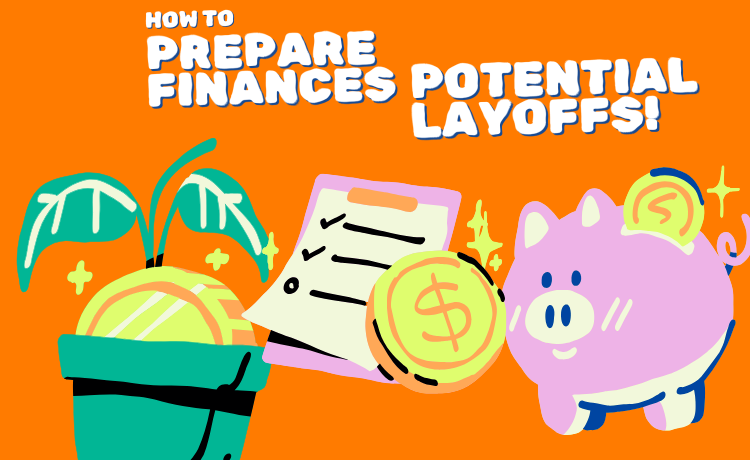Layoffs are making headlines every week, hitting industries from hospitality to tech. Even the most seasoned professionals feel uncertain.
Maybe you’ve already experienced a job loss. Maybe you’re just wondering if you could weather the storm if it comes your way. The truth is, nobody wants to scramble when the unexpected happens!
The good news? You can take control now—with strategic financial planning, practical money moves, and a healthy dose of resourcefulness.
This guide will show you how to assess your current finances, build a rock-solid safety net, cut debt, explore new income streams, and make sure you come out of a layoff stronger than before!

What we have cover!
- 1 Assess Your Current Financial Situation
- 2 Create a Budget and Build an Emergency Fund
- 3 Manage and Reduce Debt
- 4 Diversify Your Income Streams
- 5 Update Your Skills and Network
- 6 Understand Unemployment Benefits
- 7 Review Insurance Coverage
- 8 Plan for Healthcare Costs
- 9 Invest in Yourself During Down Time
- 10 Frequently Asked Questions
- 11 Take Charge of Your Financial Future!
Assess Your Current Financial Situation
The first step to financial security? Know exactly where you stand! Too many people guess at their finances, but a clear understanding of your financial situation is crucial—especially when preparing for uncertainties like a layoff. By knowing where you stand, you can create a plan to protect yourself and build a safety net.s easily.
Calculate Your Net Worth
Start with the big picture! Your net worth is the value of everything you own minus what you owe. It’s a simple calculation that can give you powerful insights into your financial health.
- List Your Assets: Include all your valuable possessions—bank balances, cash, car value, retirement accounts, investments, and even items like jewelry or that vintage record collection.
- Subtract Your Debts: Add up all your liabilities, such as credit card balances, student loans, car payments, and mortgages. These are the amounts you owe.
Tracking your net worth regularly helps you identify areas to improve, like paying off debt or increasing savings. You can use simple spreadsheets to calculate this manually or turn to tools like Mint and Personal Capital for a more automated approach.
By understanding your net worth, you’ll have a clear starting point to manage your money effectively and make informed decisions about your financial future. Read more about When and How to Ask for a Raise
Track Monthly Expenses
Where is your money really going? It’s time to dig into your spending habits to understand exactly how you’re managing your finances. Start by reviewing 1-3 months of bank and credit card statements.
- Categorize every expense: Break down your spending into clear categories like rent, groceries, coffee shop stops, streaming services, subscriptions, transportation, and more.
- Be honest! Don’t ignore those $5 lattes, late-night food deliveries, or impulse purchases—they might seem small but can quickly add up over time.
Understanding your true monthly spend can be eye-opening. It’s the first step to financial awareness and puts you in the driver’s seat when it’s time to trim unnecessary costs.
Understand Your Cash Flow

Cash flow is the balance between money coming in (income) and money going out (expenses). Ideally, you want more money coming in each month than you’re spending. If you’re consistently spending more than you earn, it’s a red flag. This pattern can lead to financial stress, especially if an unexpected event, like a layoff, occurs.
Knowing your cash flow not only helps you spot potential problem areas but also empowers you to make adjustments. Whether that’s cutting back on non-essentials, increasing your income, or setting a budget, these changes can help you create a more stable financial future.
Create a Budget and Build an Emergency Fund
A budget isn’t a punishment—it’s financial freedom! Designing a budget lets you direct your money where you need it most when times get tough.
Create a Simple Monthly Budget
- Assign your expected post-layoff income (or zero, if you’re unsure)
- Set limits for each spending category
- Prioritize essentials (housing, groceries, utilities)
- Cut or freeze all non-essentials
Apps like YNAB (You Need a Budget) and EveryDollar can make this process a breeze.
Cut Expenses Fast
If a job loss is looming, now is the time to trim. Slash anything non-critical:
- Streaming subscriptions
- Dining out
- Unused memberships or gym fees
- Fancy grocery add-ons
Redirect that cash into your emergency fund!
Build an Emergency Fund
Experts recommend saving 3-6 months of basic living expenses. Here’s how to start:
- Start small! Even $20/week adds up.
- Automate savings for consistency.
- Park funds in a high-yield savings account (check NerdWallet or Bankrate for top rates).
Having this cushion can mean the difference between panic and peace of mind!
Manage and Reduce Debt
Debt can feel overwhelming, especially when your paycheck is uncertain or at risk—but there are steps you can take to regain control of your finances. Start by getting a clear picture of your debt:
- List all debts, starting with those that have the highest interest rates (these are often credit cards or payday loans). Knowing where your money is going helps you form a plan.
- Make minimum payments on all debts to stay current and avoid late fees, but focus any extra funds you have on tackling the debt with the highest interest first. This strategy, often called the avalanche method, minimizes the total interest you’ll pay over time.
- Reach out to your lenders: Don’t wait until you’ve missed payments. Many banks and creditors offer hardship programs or payment flexibility if you explain your situation early. This can include reduced payment plans, temporary freezes, or waived fees.
If you have student loans, explore government-backed options. Programs like deferment, forbearance, or income-driven repayment plans may provide relief during tough times. Visit trusted resources like the Federal Student Aid website for detailed guidance and eligibility requirements.
Taking action now can help reduce financial stress and set you on a path to recovery, even in uncertain times. You should check out our blog on Top Paying Jobs in the Energy Sector
Diversify Your Income Streams
Don’t rely on one paycheck! In today’s uncertain economy, having multiple streams of income is more important than ever. Diversifying your income provides flexibility, security, and a financial cushion in case of unexpected expenses or job loss. Whether you’re looking to save for a big goal, pay off debt, or simply have more breathing room in your budget, adding extra income sources can make a big difference.
Explore Side Hustles
There are countless ways to earn extra money by dedicating a few hours per week to a side hustle. Some popular options include:
- Freelance writing, bartending, or catering gigs
- Driving for rideshare services like Uber or Lyft
- Pet sitting or dog walking through apps like Rover
- Selling crafts, vintage items, or handmade products on platforms like Etsy or eBay
Even a small time commitment can add up quickly, helping you reach financial goals faster. Side hustles can also be a fun and rewarding way to explore new interests or develop skills.
Consider Passive Income
If you’re looking for something less hands-on, passive income streams are a great option. Passive income is money earned with little daily involvement, making it ideal for those with full schedules. Here are a few ideas to get started:
- Rent out a spare room or property on Airbnb or SpareRoom
- Create and sell online courses on platforms like Teachable or Udemy
- Monetize a hobby by starting a blog, YouTube channel, or podcast
While passive income often requires upfront effort, such as creating content or preparing a space, it can generate long-term earnings and provide financial stability as you build and grow. Start small, experiment, and learn as you go—every little bit helps!
Update Your Skills and Network
The job market rewards the prepared! In today’s competitive landscape, staying ahead means being proactive about your professional growth. Whether you’re looking for a new job, aiming for a promotion, or just trying to stay relevant in a rapidly evolving industry, taking time to learn, adapt, and connect is essential. Here’s how you can set yourself apart:
Upskill and Reskill
The demand for new skills is constantly rising, so don’t get left behind.
- Explore free or low-cost online classes on platforms like Coursera, Udemy, and LinkedIn Learning to boost your knowledge in areas like data analytics, coding, or communication skills.
- Join workshops organized by industry groups or your local professional community to deepen expertise and stay updated on trends.
- Watch webinars to learn about trending tools, techniques, or software your peers are using.
Grow Your Network
Building and maintaining a strong professional network is key to unlocking opportunities.
- Attend in-person or virtual events such as meetups, panel discussions, or conferences. Websites like Eventbrite or Meetup.com are great for finding relevant events in your industry.
- Use LinkedIn to connect with industry leaders, recruiters, or peers and stay informed about changes in your field. Share posts and engage with others to keep your profile active.
- Reach out to former colleagues or mentors for advice, insights, or introductions to key people in your industry.
By committing to continuous learning and extending your professional circle, you’ll position yourself as a strong candidate, ready to seize new opportunities. Staying active in your field can directly lead to new job offers and career growth!
Understand Unemployment Benefits
Unemployment insurance is a lifesaver for those laid off! Each state or country has unique rules, so act fast.
How to Apply
- Apply as soon as you lose your job (often an online application).
- Gather documentation (recent pay stubs, separation notice).
- Stay available and actively job searching, as most programs require proof.
Maximize Your Benefits
- Study all available programs (Housing support, food assistance, job retraining grants).
- Explore CARES Act or similar pandemic-era provisions if still available.
Find your local office through CareerOneStop.
Review Insurance Coverage
Protect yourself from more financial shocks.
Unexpected job loss or career changes can create significant financial uncertainty, especially when it comes to insurance coverage. Proactively planning your insurance needs can help you avoid additional stress during an already challenging time. Here are some key areas to review:
- Health insurance: Losing a job often means the end of employer-provided health coverage. To ensure you’re still protected, explore options like COBRA (in the US), marketplace plans under the Affordable Care Act, or short-term health coverage. Each comes with different costs and benefits, so take the time to compare which works best for your needs.
- Life insurance: If your employer offered a group life insurance plan, you may be able to convert it into a private plan. This ensures you maintain valuable coverage that could otherwise lapse if tied to your job.
- Disability insurance: For those in professions that allow it, consider investing in a personal disability insurance plan. This can provide financial support if you are ever unable to work due to injury or illness, offering peace of mind for the future.
Take the time to talk to providers and shop around for the best rates and coverage before your current plans expire. Being proactive now can save you from greater financial challenges down the road.
Plan for Healthcare Costs
Medical bills can devastate savings! Shop smart:
- Use urgent care or telemedicine for minor issues (often cheaper than ER)
- Shop for prescription assistance programs (GoodRx, Blink Health)
- Consider community clinics and public health services
If you’re in the US, explore coverage on Healthcare.gov.
Invest in Yourself During Down Time
Layoffs are stressful, but they’re also opportunities for growth! Use your break wisely:
- Take a class or get a certification
- Start a passion project or side hustle
- Volunteer in your field (great for building skills and filling gaps on your resume)
- Focus on wellness and mental health
You’ll come out of this moment stronger and even more hirable!
Frequently Asked Questions
How much should I save in my emergency fund?
Aim for at least 3–6 months of basic living expenses. If your job is high-risk or you have dependents, lean toward 6 months.
How soon should I apply for unemployment?
Apply immediately after losing your job! Processing can take weeks.
What resources help with budgeting and debt?
Try tools like Mint, YNAB, and Credit Karma. Many banks also offer free financial counseling.
How do I choose the best healthcare plan after a layoff?
Compare benefits, premiums, deductibles, and out-of-pocket costs. Ask about subsidies on marketplace plans.
What are the best ways to earn extra income?
Freelance online, food delivery, bartending, or pet sitting! Look for options that fit your schedule and use your strongest skills.
Take Charge of Your Financial Future!
Layoffs are tough—but you’re tougher. With a proactive plan, you’ll be ready for any twist in your career. Remember:
- Assess your finances often.
- Build a budget and emergency fund.
- Cut debt and diversify income.
- Stay insured and invest in your growth.
Seize control of your future today! The right moves now can turn a setback into your best comeback yet.

